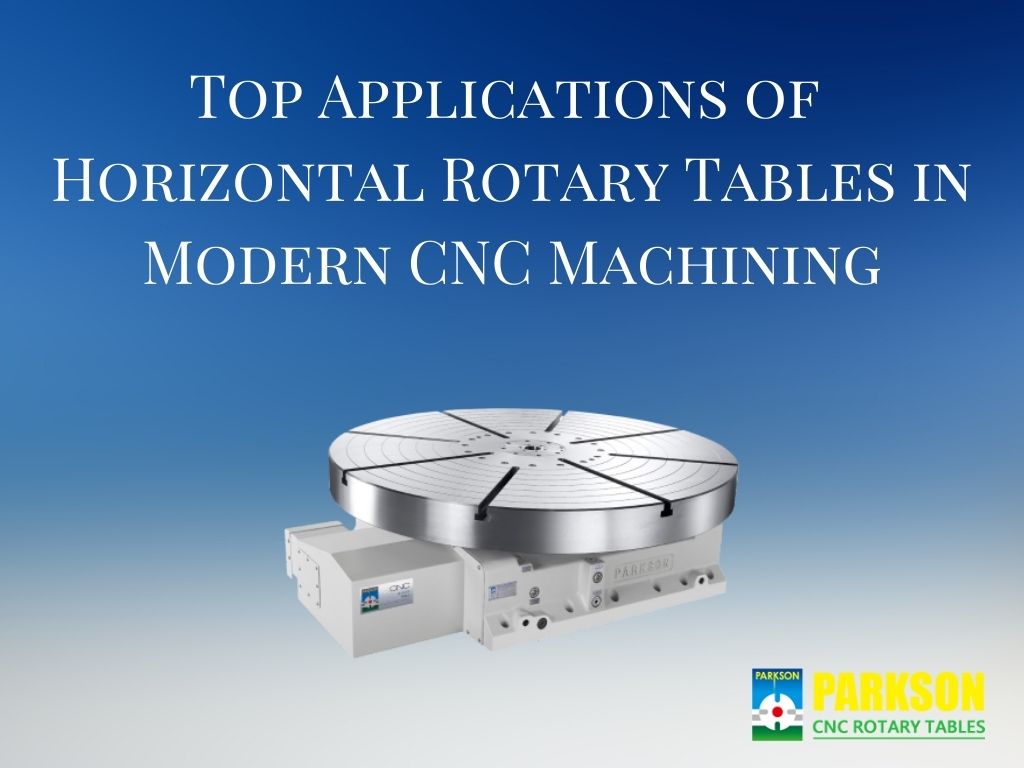
Introduction
In today’s manufacturing world, efficiency, precision, and adaptability are more important than ever. CNC machines have evolved into highly sophisticated systems, and the horizontal rotary table has become one of the most essential accessories to unlock their full potential. At PARKSON, we design and manufacture advanced rotary tables that empower manufacturers to take on complex machining challenges with confidence.
Horizontal rotary tables, mounted flat on the machine tool bed, provide stable rotation around a horizontal axis. This allows workpieces to be precisely positioned, rotated, and machined from different sides in one setup. The result is higher accuracy, reduced downtime, and greater machining flexibility. In this article, we’ll explore the top applications of horizontal rotary tables in modern CNC machining and how they help manufacturers across industries achieve superior performance.
Aerospace Components
Aerospace is one of the most demanding industries for machining accuracy. Aircraft components such as turbine blades, engine casings, and structural parts require precise geometries and tight tolerances.
Horizontal rotary tables allow manufacturers to rotate large, heavy workpieces while maintaining rigidity and accuracy. By combining the rotary motion with the machine’s X, Y, and Z axes, complex contours and aerodynamic profiles can be machined in fewer setups. This reduces cumulative errors and ensures that every part meets stringent aerospace standards. At PARKSON, our horizontal rotary tables are engineered for high load capacity and stable positioning, making them ideal for these critical applications.
Automotive Manufacturing
In the automotive sector, efficiency and cost-effectiveness are paramount. Components like transmission housings, engine blocks, and gear casings often require multi-surface machining.
Horizontal rotary tables simplify these operations by allowing parts to be rotated quickly for machining on different faces without manual repositioning. This reduces cycle times and minimizes fixture changes, enabling faster mass production. For automotive suppliers looking to balance productivity with quality, PARKSON’s CNC rotary tables provide the reliability needed to stay competitive in high-volume manufacturing environments.
Mold and Die Making
Mold and die making requires machining of intricate geometries, deep cavities, and complex contours. Traditional setups often involve multiple re-clampings, which can introduce errors and waste valuable time.
By using horizontal rotary tables, mold makers can achieve multi-axis machining in a single setup. Continuous rotation makes it easier to produce spiral grooves, helical shapes, and 3D surfaces with exceptional accuracy. The stability of PARKSON’s rotary tables ensures a smooth surface finish, which is critical for high-quality molds used in plastics, die-casting, and stamping applications.
Energy and Power Equipment
Large-scale energy equipment, such as wind turbine hubs, power generation components, and heavy-duty pumps, require machining of bulky workpieces with high precision.
Horizontal rotary tables provide the necessary support and rotation for such oversized parts. With hydraulic clamping systems and heavy load-bearing capacity, they enable stable machining of large components while ensuring alignment and accuracy. For renewable energy and heavy machinery manufacturers, PARKSON’s solutions help improve efficiency while reducing downtime in machining oversized parts.
Medical Device Industry
Precision is the cornerstone of medical device manufacturing. Small surgical instruments, orthopedic implants, and diagnostic components demand fine tolerances and smooth finishes.
Horizontal rotary tables enable simultaneous machining of multiple surfaces in a compact footprint, reducing errors caused by re-clamping delicate parts. By combining high precision with repeatable accuracy, PARKSON’s CNC rotary tables support medical manufacturers in producing life-saving instruments and devices that meet strict industry regulations.
General Industrial Applications
Beyond specialized industries, horizontal rotary tables are widely used in general manufacturing. From producing machine tool parts to machining gears, shafts, and fixtures, they offer flexibility for a wide range of workpieces.
The ability to index, rotate, and position parts quickly makes them a valuable tool in workshops where versatility is key. PARKSON provides rotary tables in various sizes and configurations to accommodate both small precision parts and heavy industrial components.
PARKSON CNC Rotary Table Features
At PARKSON, we pride ourselves on delivering rotary tables that match the diverse needs of modern industries. Our horizontal CNC rotary tables are designed with the following key features:
-
High-Precision Positioning: Torque motor and direct-drive options provide zero backlash and repeatable accuracy.
-
Robust Construction: Built for heavy loads and long-term durability, ensuring stability during demanding machining operations.
-
Flexible Integration: Compatible with different CNC machines and adaptable for multi-axis setups.
From the HMC and HMD series to advanced Hirth coupling designs, our product range is built to support applications ranging from mass production to ultra-precision machining.
Conclusion
Horizontal rotary tables are more than just an accessory—they are an enabler of modern CNC machining. By reducing setups, improving accuracy, and enabling complex multi-surface machining, they bring efficiency and versatility to industries worldwide.
At PARKSON, we are committed to supporting manufacturers with advanced rotary table solutions tailored to their machining needs. Whether you’re in aerospace, automotive, medical, or general manufacturing, our products are designed to help you achieve superior performance.

